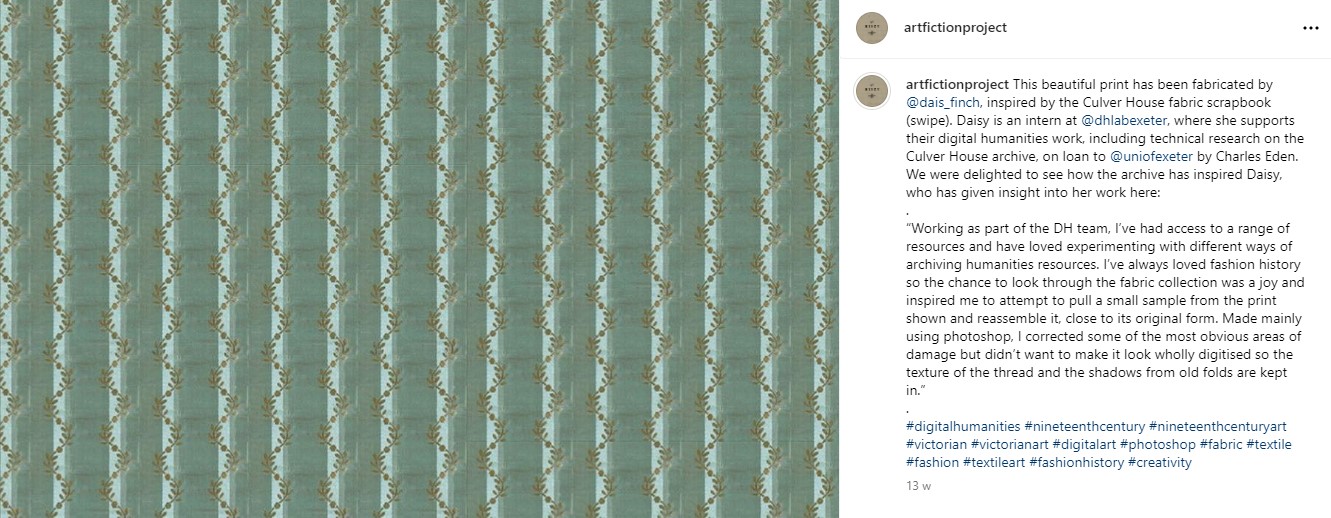Each year we ask our interns to write a blog post at the end of their time working with us looking back on their time in the DH Lab. Here is the second of this year’s blogs from Daisy:
Working as part of the Digital Humanities Team alongside my third-year studies has been an incredible opportunity. From processing reel-to-reel tapes of Cornish farmers to building 3D prints in the Makerspace, this placement has taught me an astounding range of technical skills that I look forward to applying in my further study and future career. A particular highlight was getting to explore the audio-visual suite, namely, practise recording and editing my own pseudo-scripts. As an aspiring journalist, this was invaluable and immediately applicable to my goals beyond university study as well as proving to be the perfect titbit to bring up in my master’s interview!
Beyond media experience, the DH Lab provided the support to pursue my interest in textile history. I was able to look through a large collection of scraps collected by a 19th century socialite which detailed her dresses and their adornments. From this, coupled with my use of the lab’s access to Adobe Photoshop while working on the front desk, I was able to reconstruct an approximation of what a whole piece of fabric may have looked like from a two-by-six-inch scrap of embossed satin. ‘The Art of Fiction’ project (@artfictionproject) who had previously posted the page of the book containing these small snippets of fabric then uploaded this image onto their Instagram page. It was wonderful to get the chance to breathe new life into a beautiful piece of textile history and to then have this shared where it would most be of interest. Working as part of the DH Lab often means working with the wider University team, across both the Streatham site and Penryn archives, and this small project provided a micro-scale model of the creative community Digital Humanities forms a key part of.

As well as the chance to work on my own projects, shifts spent in the lab offered a variety of ways to process and digitise media. This involved spending time taking high quality 150mp photographs of 19th century playbills, school photographs from the 1970s and small letters that sometimes included absent minded sketches made by the author. As well as professional archival photography and audio-visual editing, the intern team were regularly trained on new equipment. These techniques included photogrammetry, namely constructing 3D models from repeated and slightly differing photographs, and RTI, photographs taken at different heights and angles of light in a specially constructed dome. These training sessions fed into our individual lab sessions in which I began my RTI work by processing handmade lace from a team member’s collection. From further discussions with Gary Stringer on his collection of textiles, he brought in a set of lace bobbins and explained the history of lacemaking itself, specifically regarding Bedfordshire lace. I was then lucky enough to try out a few basic stitches and am now searching for a set of bobbins for myself!
Although my degree and much of my work has focused on the humanities, I’ve enjoyed the more mathematical, technical side of work at the lab just as much. Taking on this placement with the lab has shown me how my degree significantly overlaps in the real world, using skills from both Art History and Mathematics together to produce digital resources. Both Julia Hopkin and Gary Stringer have provided invaluable teaching on the applications of coding, guiding the internship team through the basics of coding and Badger 2040 badges.
One of my last commitments as an intern was helping at the Open Day for the university, answering visitors’ questions and providing tours around the lab. It was the perfect day to bookend both my student experience and my time at the lab, showing potential Exeter University students around the facilities and speaking about how much the DH Lab has to offer.
Reflecting on my time with Digital Humanities, I would highly recommend anyone interested to apply to the internship placements. As a truly entry-level job, you work as part of a supportive and welcoming team to learn countless professional skills that are useful in any industry and provide you with a foundational knowledge of the work environment while you study. It has made what would already have been a memorable year even more so and I can’t thank the team enough for their enthusiasm and generosity!
